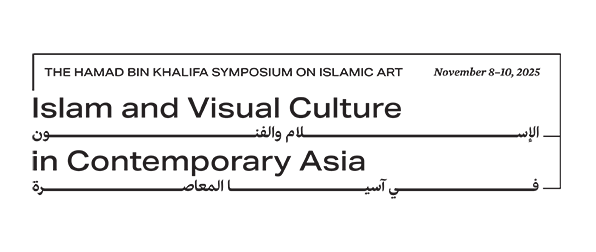History of the Hamad bin Khalifa Symposium on Islamic Art
The Hamad bin Khalifa Symposia on Islamic Art address significant themes and issues in understanding the visual arts of the Islamic lands. In line with the Emir’s desire to make Qatar a leader of university education in the Gulf and the Arab world, these symposia seek to make the latest and most interesting scholarship in this growing field of Islamic art available and accessible to a wide audience, ranging from students and scholars to artists, architects, designers and the interested public.
The first symposium, titled Expanded Frontiers, was held in Richmond, Virginia in 2004, where eight scholars addressed a range of topics from the history of Islamic art to its relationships with the arts of Christian Europe. The second symposium, Rivers of Paradise: Water in Islamic Art and Culture, was held in Doha, Qatar in 2007 where 12 speakers approached the many meanings and roles of water in Islamic art and society from religious, literary, archeological, architectural, and functional perspectives. The third symposium, And Diverse Are Their Hues: Color in Islamic Art and Culture, was held in Córdoba, Spain in 2009, and included original presentations by thirteen speakers on the role of color in Islamic art and culture. God Is Beautiful; He Loves Beauty: The Object in Islamic Art and Culture, the fourth symposium, was held at the Museum of Islamic Art in Doha, Qatar in 2011, where 12 speakers presented papers on objects in the museum’s collection, covering the principal media, periods, and regions of Islamic art from its origins to the present.
In 2013, God Is the Light of the Heavens and the Earth: Light in Islamic Art and Culture was held in Palermo, Italy, where 13 speakers, including the artist Shirin Neshat, addressed the integral role of light in Islamic civilizations across a wide range of media. The 2015 Symposium, By the Pen and What They Write, in Doha, explored the central role of the written word in Islam and how writing practices have evolved and adapted in different historical contexts.
The 2017 Symposium was held the Virginia Museum of Fine Arts; titled Islamic Art: Past, Present and Future, the gathering of 14 speakers — including Her Excellency Sheikha Al Mayassa bint Hamad bin Khalifa Al Thani and the noted contemporary artists Lalla Essaydi and Shahzia Sikander – discussed a range of issues in the contemporary art of the Middle East. The Seas and the Mobility of Islamic Art and Culture traced the currents of change that unite the visual and material culture of the Islamic world across space and time. It was held in Doha, Qatar on the campus of VCUarts Qatar in November 2019. The Environment and Ecology in Islamic Art and Culture was held online from November 8 to November 15, 2021. For the program, please visit the Publications page of the website. The proceedings of each symposium have been published by Yale University Press.
Sponsored by Virginia Commonwealth University (VCU) School of the Arts in Richmond, Virginia, VCUarts Qatar and Qatar Foundation, the Hamad bin Khalifa Symposium on Islamic Art seeks to explore broad issues in the visual arts of the Islamic world. The symposia were organized by Sheila Blair and Jonathan Bloom, shared holders of the Hamad bin Khalifa Endowed Chair for Islamic Art at VCU, from 2004 to 2017, and in 2019 and in 2021, it was organized by a committee of art historians at VCUarts Qatar, including Radha Dalal, Director of Art History and Associate Professor of Islamic Art, VCUarts Qatar; Jochen Sokoly, Associate Professor of Islamic Art, VCUarts Qatar; and Sean Roberts, Lecturer in Early Modern Art at the University of Tennessee and Affiliated Associate Professor at VCUarts Qatar. It is now chaired by Hala Auji, the Hamad bin Khalifa Endowed Chair for Islamic Art at VCU School of the Arts, and Radha Dalal. The Hamad bin Khalifa Symposium Project Manager has been Marisa Angell Brown since 2008.


